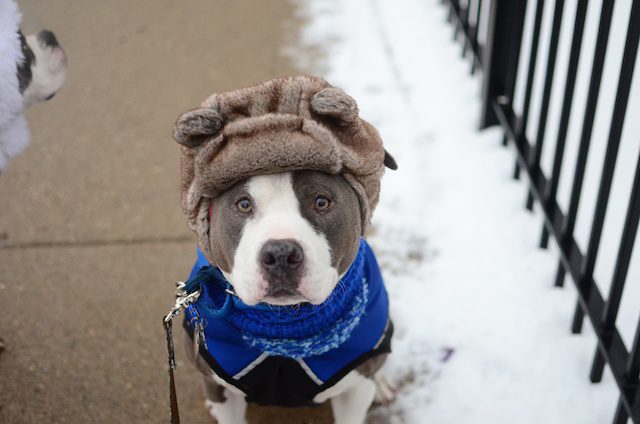The winter freeze is officially here. And in the northern and eastern parts of the US, the temperatures have already dipped well below below freezing. As unpleasant as this type of weather is for us, it is miserable for our pets too. Unfortunately, some people continue to leave their animals outside in these conditions, which can mean serious injury or even worse, death for their dogs, cats, horses, rabbits, pigs, etc.
Please always bring your pets inside during during extreme weather (heat, cold, rain, snow, hail, sleet.) They deserve to be given shelter, a warm bed and food and clean water, just like any human. And here are some other great tips, compiled by the ASPCA, for taking care of your pets during the winter months.
- Repeatedly coming out of the cold into the dry heat of your home can cause itchy, flaking skin. Keep your home humidified and towel dry your pet as soon as he comes inside, paying special attention to his feet and in-between the toes. Remove any snow balls from between his foot pads.
- Never shave your dog down to the skin in winter, as a longer coat will provide more warmth. If your dog is long-haired, simply trim him to minimize the clinging ice balls, salt crystals and de-icing chemicals that can dry his skin, and don’t neglect the hair between his toes. If your dog is short-haired, consider getting him a coat or sweater with a high collar or turtleneck with coverage from the base of the tail to the belly. For many dogs, this is regulation winter wear.
- Bring a towel on long walks to clean off stinging, irritated paws. After each walk, wash and dry your pet’s feet and stomach to remove ice, salt and chemicals—and check for cracks in paw pads or redness between the toes.
- Bathe your pets as little as possible during cold spells. Washing too often can remove essential oils and increase the chance of developing dry, flaky skin. If your pooch must be bathed, ask your vet to recommend a moisturizing shampoo and/or rinse.
- Massaging petroleum jelly or other paw protectants into paw pads before going outside can help protect from salt and chemical agents. Booties provide even more coverage and can also prevent sand and salt from getting lodged between bare toes and causing irritation. Use pet-friendly ice melts whenever possible.
- Like coolant, antifreeze is a lethal poison for dogs and cats. Be sure to thoroughly clean up any spills from your vehicle, and consider using products that contain propylene glycol rather than ethylene glycol.
- Pets burn extra energy by trying to stay warm in wintertime. Feeding your pet a little bit more during the cold weather months can provide much-needed calories, and making sure she has plenty of water to drink will help keep her well-hydrated and her skin less dry.
- Make sure your companion animal has a warm place to sleep, off the floor and away from all drafts. A cozy dog or cat bed with a warm blanket or pillow is perfect.
- Remember, if it’s too cold for you, it’s probably too cold for your pet, so keep your animals inside. If left outdoors, pets can freeze, become disoriented, lost, stolen, injured or killed. In addition, don’t leave pets alone in a car during cold weather, as cars can act as refrigerators that hold in the cold and cause animals to freeze to death.
What is your most effective tip for taking care of your pet(s) during the winter? Comment below!










